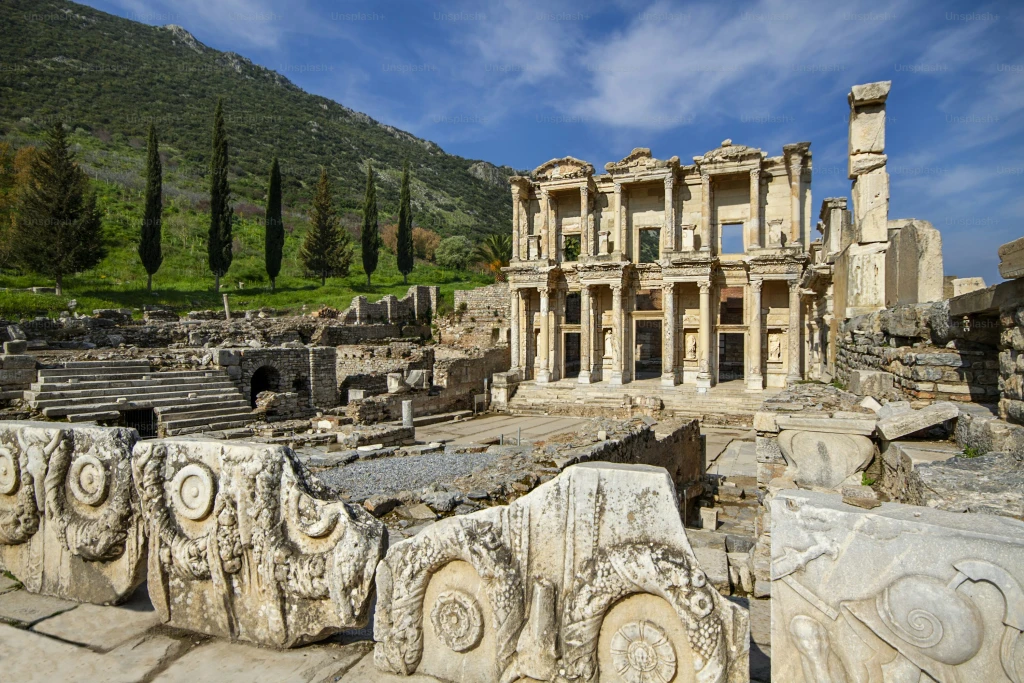Exploring the Timeless Beauty of Ephesus: A Journey Through Ancient Wonders

Exploring the Timeless Beauty of Ephesus: A Journey Through Ancient Wonders
Nestled in the heart of modern-day Turkey, Ephesus is not just a city; it is a gateway to the past, an emblem of ancient grandeur that has fascinated travelers for centuries. This archaeological wonder is a testament to the rich history of the Greco-Roman world and holds an unmatched allure for those who yearn to walk the paths of classical antiquity.
A Glimpse into History
The roots of Ephesus stretch back to the 10th century BC when it was founded by Greek colonists. Its strategic location by the Aegean Sea made it a thriving trade hub and cultural melting pot, with influences from Greek, Persian, and Roman civilizations shaping its development. At its peak, during the Roman Empire, Ephesus was one of the largest and most prosperous cities in Asia Minor, boasting a population of over 250,000.
Ephesus’ glory is not just a story of wealth and power; it is a chronicle of the resilience and spirit of its people. As you step into this ancient city, you’re transported to an era where architectural brilliance met cultural sophistication.
Iconic Landmarks That Will Leave You in Awe
- The Library of Celsus Arguably the most photographed structure in Ephesus, the Library of Celsus stands as a striking representation of Roman architectural prowess. Built in 135 AD in honor of Tiberius Julius Celsus Polemaeanus, a Roman senator, this grand library once held over 12,000 scrolls and served as a mausoleum for Celsus himself. Today, its meticulously reconstructed façade, with towering Corinthian columns and intricately carved statues, evokes a sense of timeless knowledge and power.
- The Great Theatre With a seating capacity of around 25,000, the Great Theatre of Ephesus was not just a place of entertainment but a hub of political and social discourse. Carved into the slope of Mount Pion, it is believed that the Apostle Paul once preached here, adding a layer of spiritual significance to its already storied history. Imagine sitting among the stone seats, surrounded by the whispers of the past and the breathtaking view of the harbor road that once connected the city to the sea.
- Temple of Artemis No visit to Ephesus would be complete without acknowledging the remnants of the Temple of Artemis, one of the Seven Wonders of the Ancient World. Though only a few columns remain today, its historical significance as a monumental dedication to the goddess Artemis is undeniable. In its prime, this temple was four times larger than the Parthenon in Athens and drew worshippers from across the ancient world.
The Spirit of Ephesus Lives On
Walking through the cobblestone streets of Ephesus is a unique experience that leaves an indelible mark on visitors. The preserved ruins speak of a city that was vibrant with life, where merchants, scholars, and artisans coexisted in a dynamic and prosperous environment. The Marble Street, lined with remnants of shops and public baths, whispers tales of daily life—of bustling markets, philosophical discussions, and the aroma of exotic spices.
The Terrace Houses: A Peek into Luxurious Living
For those who seek deeper insight into the lives of Ephesus’ elite, the Terrace Houses are an absolute must-visit. These well-preserved residential complexes feature exquisite mosaics, frescoes, and even indoor plumbing—a testament to the opulence and advanced engineering of the time. Marvel at the detailed artwork depicting mythological scenes, and imagine the social gatherings that once took place within these walls.
Sacred Spaces and Spiritual Echoes
Ephesus was not just a commercial and cultural center; it was also a place of spiritual significance. The Basilica of St. John, located on the nearby Ayasuluk Hill, is believed to be the burial site of John the Apostle. This site offers a serene contrast to the bustling ruins below and provides panoramic views of the surrounding landscape. It’s a poignant reminder of Ephesus’ importance as a focal point in early Christianity.
Tips for an Enriching Visit
To make the most of your visit to Ephesus, consider starting early in the morning to enjoy the site before it becomes crowded. Wear comfortable walking shoes and bring plenty of water—the sun can be relentless, especially in the summer months. Guided tours are highly recommended as they offer fascinating insights and stories that bring the ruins to life. For those who prefer a more personal experience, audio guides are also available.
Ephesus Beyond the Ruins
While the ancient city itself is a marvel, the surrounding areas offer even more to explore. The nearby town of Selçuk boasts the Ephesus Museum, where many of the artifacts discovered during excavations are displayed. Just a short drive away, the House of the Virgin Mary is a site of pilgrimage and reflection, nestled in a peaceful setting atop the Bulbul Mountain.
Conclusion
A visit to Ephesus is not just a journey through stone and relics; it is an immersive experience into the lives and legacies of those who walked these streets thousands of years ago. The echoes of history that resonate through the city remind us of our shared human heritage and the stories that continue to inspire. So, whether you’re an avid history buff or a curious traveler, Ephesus promises an unforgettable adventure that bridges the past with the present.
Pack your sense of wonder and step into the time machine that is Ephesus. Your journey into antiquity awaits.








